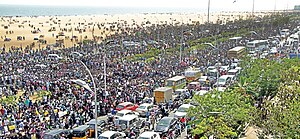2017 pro-Jallikattu protests
| 2017 pro-jallikattu protests | |||
|---|---|---|---|

Pro-Jallikattu protesters gathering at Chennai Marina Beach
|
|||
| Date | 8 January 2017 – 23 January 2017 (15 days) |
||
| Location | Tamil Nadu, India | ||
| Causes | Supreme Court's ban against jallikattu | ||
| Goals |
|
||
| Methods | picketing, sloganeering, human chain,silent protest, hunger strike, demonstration, internet activism, candlelight vigil | ||
| Result | Tamil Nadu state legislation passed legalising jallikattu | ||
| Number | |||
|
|||
| Casualties | |||
| Injuries | > 60 (Including 30 police personnel) | ||
The 2017 pro-jallikattu protests, also known as the pro-jallikattu movement or Thai Puratchi, refers to numerous leaderless apolitical youth groups protesting in January 2017 in large groups in several locations across the Indian state of Tamil Nadu, with some sporadic smaller protests taking place across India, as well as overseas. The chief motivation of the protest is against the Supreme Court's order to ban jallikattu (occasionally also known as sallikattu, eru taluval, or manju virattu), a traditional Tamil bull taming sport, which is held during Pongal, a harvest festival in the state of Tamil Nadu, India. The sport is conducted annually on the second day of the Tamil month Thai. The sport was banned by the Supreme Court in a decision citing animal cruelty based on a lawsuit filed by the animal rights activists group, People for the Ethical Treatment of Animals (PETA), which asserted that the tradition violates the Prevention of Cruelty to Animals Act (PCA).
The first large protests occurred on 8 January 2017, when several groups, organised largely via social media, conducted a protest at the Marina beach in Chennai to revoke the ban on jallikattu which was imposed in 2014. These groups also demanded that PETA be banned from India. The protests soon gained momentum and spread all over Tamil Nadu. After several days of protests, jallikattu was finally legalised locally on 23 January when the Government of Tamil Nadu passed a bill to amend the PCA Act. As the legalisation is not Indian federal law, but rather state law, there is concern from Indian legal experts that jallikattu could be banned once again by the Supreme Court.
The largely peaceful nature of the protests received praise from all over the country and inspired the legalisation movements of several other Indian states' traditional outlawed celebrations. Despite violence on 23 January, this perception continued after the Tamil Nadu Police reported that the violence was caused by "anti-social elements" co-opting the protest, and not the student protesters themselves. The movement has been described as a symbol for Tamil pride and has largely been compared to the anti-Hindi agitations of Tamil Nadu and dubbed by many as 'Thai Puratchi'.
...
Wikipedia
